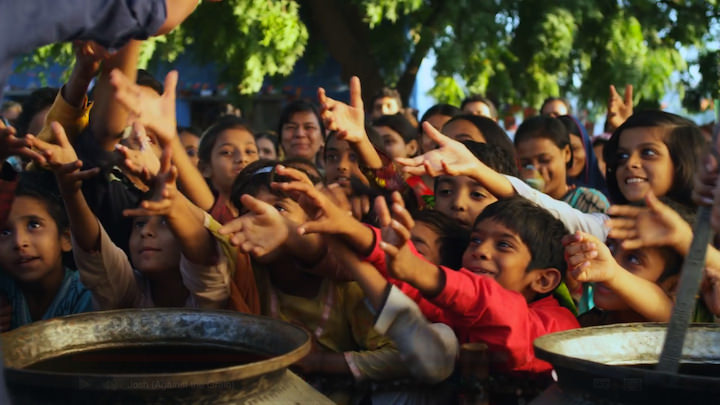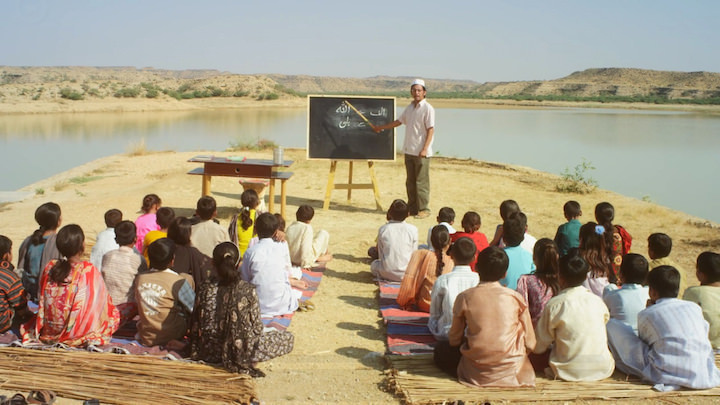
She went from being a nerd at Caltech to an independent filmmaker, bringing to light the stories of heroic women in her country. And she just finished directing the comedy “The PHD Movie 2: Still in Grad School”, based on the massively popular web comic, PhdComics. Meet Iram Parveen Bilal – a feisty, intelligent and eloquent Pakistani woman, who symbolizes the fresh blood of new wave cinema in Pakistan.
Even the name is so magnificent that it inspired Bollywood director Sriram Raghavan to name Kareena Kapoor’s character in Agent Vinod after her.
Iram met us over coffee at Stories Books and Cafe –a quaint bookstore on West Sunset Boulevard, full of rare books, organic coffee and a patio dotted with writers and artists, seated against vibrant wall graffiti. She tells us that it is in places like these where she finds a corner to write her scripts, never imagining that those thoughts could have any real world impact. As they sure did with her debut feature film ‘Josh’.
‘Josh’ (English: Against the Grain) is a deeply humanitarian account inspired, in part, by the life of Parveen Saeed –a woman who rose above her circumstances and started a self-funded community service called Khana Ghar (food kitchen), to provide meals for deprived families in the slums around Karachi. This is not the Pakistan we see in Bollywood or in world media –both of which are often vilifying the country with their single story of terrorism. Neither is it a romanticized depiction of Pakistan’s educated urban elite. Rather, ‘Josh’ is rooted in realism, and its themes are fueled by the seething frustration of Pakistan’s youth, who refuse to resign to their society’s antiquated ‘norms’. It is the story of everyday heroes rebelling against the system and rebuilding their nation, one child at a time.

After the screening of ‘Josh’ at the Indian Film Festival of Melbourne, a man from the audience set up a fundraiser which allowed Khana Ghar to sustain the ration for 140 families during the entire month of Ramadan. “Parveen called me and said that I want you to hand out the meals.”, Iram recollects. “It was the most overwhelming experience of my life. There was a line of women in veils, stampeding over each other, snatching the ration from my hands, for their children. I turned around with tears in my eyes because I needed a minute to take it all in. It was so humbling.”
Iram, whose mother is a physicist and father, a chemistry professor, spent the early years of her childhood in Nigeria. Her family moved back to Islamabad in the early 90s, where she finished middle and high school. Like everyone in the subcontinent, she grew up in a Bollywood-obsessed culture. From Mithun’s disco to Madhuri’s dance routines and Yash Chopra’s epic romances -she absorbed it all. After graduating as an environmental science engineer from Caltech, she decided to take the year off and went backpacking all around India. It was after that year of travel that she went to study film at the University of Southern California.
“We can’t deny that our societies are patriarchal. But is Hollywood any different?”
How was it going from a nerdy kid in Islamabad to a fledgling filmmaker with no connections in Karachi? “It was tough. Not because I’m a woman, but more so because I don’t come from a film background.”, says Iram. “Just like Bollywood, there is a lot of nepotism in Pakistan -what is your last name, what does your father do? The social discrimination is in the DNA of our people. Of course being a girl and being young is also a factor. We can’t deny that our societies are patriarchal. But is Hollywood any different? In fact, in our cultures, gender discrimination is out there in the open. Here, it is passive-aggressive -nobody admits it. Look at what’s happening. Jill Soloway just spoke. Salma Hayek spoke at Cannes.”

Arriving in Karachi, her team realized that there was no infrastructure in place for filmmaking. “Nobody was making films in Pakistan at the time. We were incidentally accredited as one of the pioneers of the new wave. In the months preceding the release of Josh, some other Pakistani films were released, and so 2013 was touted as the revival of Pakistani cinema.”
“Why do people only make documentaries about Pakistan? You see what Slumdog Millionaire did for the slums in India, I don’t know how many documentaries could have raised that level of awareness.”
Parveen Saeed’s inspiring story fell upon Iram while she was assisting on the documentary film ‘Bhutto’. “I was sitting in LA transcribing Parveen’s interview where she was saying, ‘All I ask of you is a fistful of flour. Give me a fistful of flour and I’ll run Khana Ghar’. I was so moved. How do you say no to such a simple ask? It just burned a hole in my mind. My co-producer suggested that we should make a documentary on her story. And I asked, why do people only make documentaries about Pakistan? You see what Slumdog Millionaire did for the slums in India, I don’t know how many documentaries could have raised that level of awareness. I want to make fiction.”
Iram feels strongly about artists being grossly undervalued in her country today. There is a poignant moment in Josh, where a woman haggles with a poor artist who is selling his paintings on the sidewalk, even though his pieces are already ridiculously cheap. “That scene was precious to me because I am sick and tired of the fact that artists have no value in our culture.”, says Iram. “In another scene, Adil refuses to accept a partial payment for his illustration, and walks out angrily saying ‘Artists are the true voice of this nation’. It’s very on the nose, but I chose to keep it that way.”

The film also alludes to the infamous Mukhtar Mai gang rape scandal (2002), which was ordered by a tribal court as a form of ‘honor revenge’. According to custom, Mukhtar Mai was expected to commit suicide after the incident, but instead she spoke up and pursued the case, until her rapists were sent to prison. However, their sentences were later repealed and they were acquitted for lack of evidence. “Mukhtaran is an amazing woman.”, says Iram “She opened a school for girls in her village, and the children of her rapists are allowed to attend this school for free. Mukhtaran believes that this is what will bring about real change.”
“To me this film is not about all the issues in my country. It is about the people who stand up and fight.”
Josh begins with a beautiful musical montage and a voiceover reciting the lines of a poem by Allama Iqbal, who is regarded as Mufakkir-e-Pakistan (“The Thinker of Pakistan”). Summing up her feelings about the film, Iram reflects, “To me this film is not about all the issues in my country. It is about the people who stand up and fight.”
Finally, we had to ask Iram about The PHD Movie 2. What was it like to handle a diametrically opposite genre –a grad school comedy, based on Jorge Cham’s PhdComics, which enjoys a huge fan following all around the world?

“It was a very interesting challenge for me because it was so different from all my earlier work.”, she expresses. “I had to keep in mind that every aspect of the film –production design, costume design, camera movement, sound design –everything needs to amplify the comedy.”
If the movie’s trailer is any indication, we’re in for a laugh riot this fall.

‘Josh (Against the Grain)’ is available for streaming on Netflix, Amazon Instant Video and iTunes. Iram was recently selected for the Women In Film/Sundance Financier’s Intensive Program and is a co-chair on the Asian American Writer’s Committee at the Writer’s Guild of America. She is the founder of Pakistan’s first professional screenwriting lab (QALAMBAAZ).















